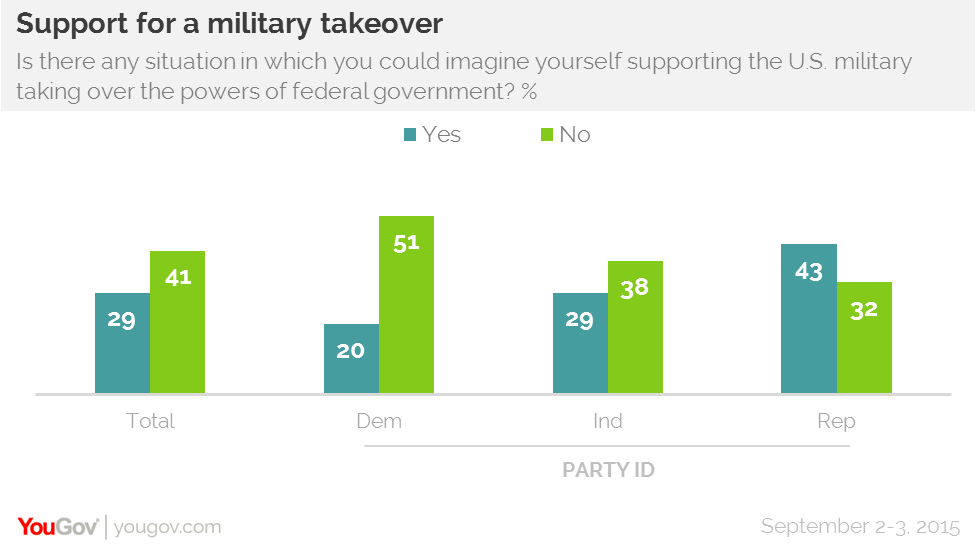A Military Coup in the U.S.? A Surprising Number of Americans Might Support One

Imagine you’re watching the evening news, kicking back after a long day in the cubicle. Suddenly a breaking news alert flashes across the screen: “Military Coup Overthrows the Government.” What would be your reaction?
While most Americans say they can’t imagine supporting a takeover of the government by the armed forces, or least aren’t sure about it, a substantial number of people say they can imagine supporting the military in such a scenario.
In a new survey by YouGov, 29 percent of respondents said they can imagine a situation in which they would support the military taking control of the federal government – that translates into over 70 million American adults. Forty-one percent of respondents said could not imagine supporting the military taking over the country.
Related: With $8.5 Trillion Unaccounted for, Why should Congress Increase the Defense Budget?
Republicans (43 percent) were more likely to say they can envision a scenario in which they could support a military coup than Democrats (20 percent). Perhaps that difference is related to having a Democratic president who some critics on the right see as overstepping his power.
Regardless of political ideology, one reason people might support a military coup is because they respect officers in the military far more than they do people in Congress. According to the same YouGov survey, almost three-quarters (70 percent) of respondents believe that military officers want what is best for the country, while only 29 percent think the same of members of Congress.
Lawmakers better shape up or they might be shipped out -- literally.

Top Reads From The Fiscal Times
- A Conservative Rebellion is Brewing on Capitol Hill
- 9 ISIS Weapons That Will Shock You
- There’s Only One Candidate People Actually Like – and It’s Not Trump or Clinton
Small Business Owners Say They’re Raising Worker Pay
A record percentage of small business owners say they are raising pay for their workers, according to the latest monthly jobs report from the National Federation of Independent Business, based on a survey of 10,000 of the group’s members. A seasonally adjusted net 35 percent of small businesses say they are increasing compensation. “They are increasing compensation at record levels and are continuing to hire,” NFIB President and CEO Juanita Duggan said in a statement accompanying the report. “Post tax reform, concerns about taxes and regulations are taking a backseat to their worries over filling open positions and finding qualified candidates.”
The US Is Running Short on More Than 200 Drugs

The U.S. is officially running short on 202 drugs, including some medical staples like epinephrine, morphine and saline solution. “The medications most vulnerable to running short have a few things in common: They are generic, high-volume, and low-margin for their makers—not the cutting-edge specialty drugs that pad pharmaceutical companies’ bottom lines,” Fortune’s Erika Fry reports. “Companies have little incentive to make the workhorse drugs we use most.” And much of the problem — “The situation is an emergency waiting to be a disaster,” one pharmacist says — can be tied to one company: Pfizer. Read the full story here.
Chart of the Day: Could You Handle a Sudden $400 Expense?

More Americans say they are living comfortably or at least “doing okay” financially, according to the Federal Reserve’s Report on the Economic Well-Being of U.S. Households in 2017. At the same time, four in 10 adults say that, if faced with an unexpected expense of $400, they would not be able to cover it or would cover it by selling something or borrowing money. That represents an improvement from 2013, when half of all adults said they would have trouble handling such an expense, but suggests that many Americans are still close to the edge when it comes to their personal finances.
Kevin Brady Introduces Welfare Reform Bill

The Tax Policy Center’s Daily Deduction reports that Rep. Kevin Brady (R-TX), chair of the House Ways and Means Committee on Friday introduced The Jobs and Opportunity with Benefits and Services (JOBS) for Success Act (H.R. 5861). “The bill would rename the Temporary Assistance for Needy Families (TANF) program and target benefits to the lowest-income households. Although the House GOP leadership promised to include an expansion of the Earned Income Tax Credit as part of an upcoming welfare reform bill, this measure does not appear to include any EITC provisions.” The committee will mark up the bill on Wednesday.



